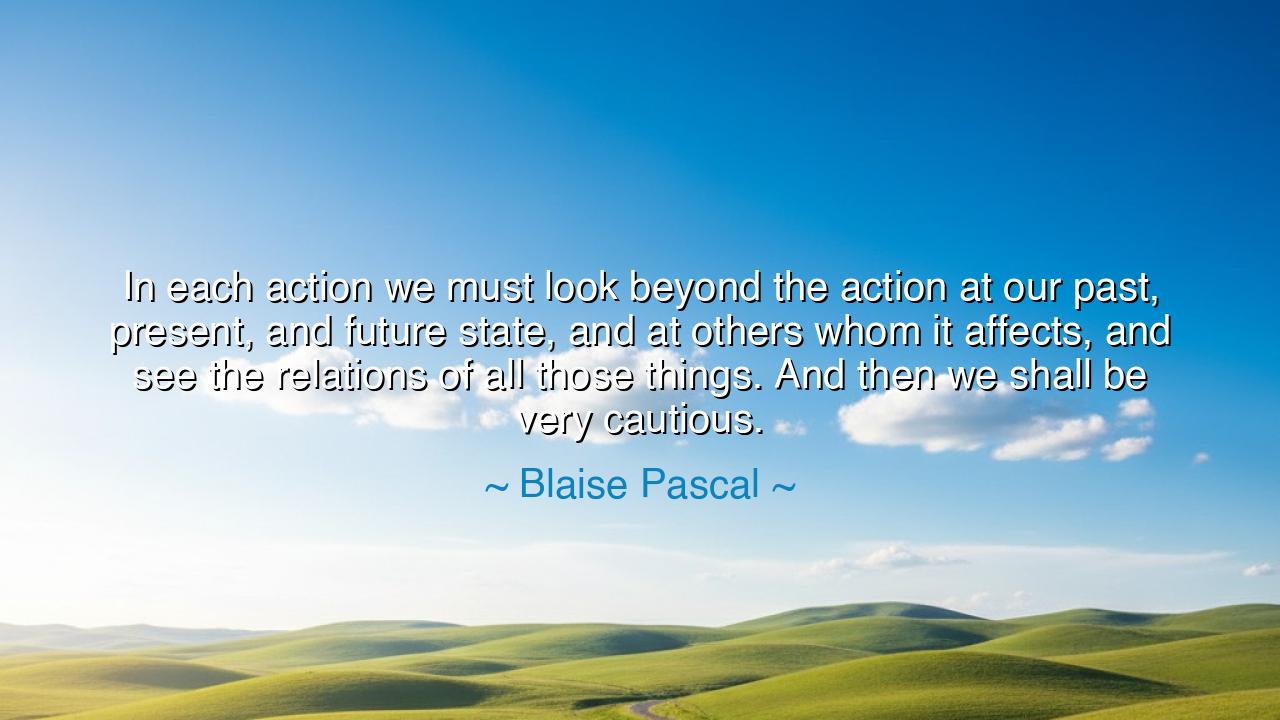
In each action we must look beyond the action at our past
In each action we must look beyond the action at our past, present, and future state, and at others whom it affects, and see the relations of all those things. And then we shall be very cautious.






"In each action we must look beyond the action at our past, present, and future state, and at others whom it affects, and see the relations of all those things. And then we shall be very cautious." These words of Blaise Pascal, the great French philosopher and mathematician, echo the profound wisdom of considering not only the immediate result of our actions but the broader, interconnected web that surrounds them. Pascal calls upon us to pause before we act, to reflect upon the legacy of our choices, the ripples they send across time, and the impact they bear on others. This is not mere hesitation—it is a deep, conscious awareness of our place in a vast, flowing river of life.
In this teaching, Pascal implores us to see beyond the moment, to transcend the narrow view of the present. We are not isolated in time, nor are we solitary beings. Our lives are shaped by the weight of the past, the urgency of the present, and the uncertainty of the future. Every action is a link in an endless chain, and when we fail to recognize the full scope of that chain, we act carelessly. The ancient wisdom tells us that those who act without consideration are like reckless sailors steering their ships without regard for the unseen currents that guide them, unaware of the shores they may soon strike.
Let us recall the story of Socrates, the great philosopher who, in his final moments, chose to face death with unwavering calm. His actions, in choosing the path of philosophical truth over life itself, were rooted in his deep understanding of the interconnectedness of all things. He did not act in haste, nor did he flee from the consequences of his choices. He reflected on the past lessons of his life, the present state of his soul, and the future consequences of his death for his students and the society at large. His caution was not born of fear but of a profound respect for the larger truths that governed his life and the world around him.
Pascal’s caution is not born from mere self-interest. It calls us to recognize the interdependence of all. Consider, for example, the decisions made by great leaders. Gandhi, in his fight for India’s independence, understood that his actions in the present would echo across generations. His commitment to nonviolence was not simply about the immediate struggles of his time but about planting seeds for a future where all people could live in peace and dignity. His foresight and restraint in his actions were driven by his understanding that every decision affects not only the present moment but the unfolding of history itself.
In our daily lives, Pascal’s teaching reminds us that every action we take reverberates beyond our own time. A simple gesture, a word spoken in anger, a hasty decision made in the heat of the moment—these seemingly small acts can shift the course of events and alter the paths of those around us. The relationships we build, the choices we make, and the ways in which we engage with the world are part of an intricate web of cause and effect. As we reflect on our own lives, we must ask: How does this moment connect to the past? How will it shape the future? And how does it affect those around me?
The lesson Pascal offers is one of reflection and caution. Before we act, we must think deeply. Will our actions harm others? Will they perpetuate the mistakes of the past or pave the way for a better future? In a world of instant gratification and short-term thinking, this call to pause and consider the broader picture is as vital as ever. It urges us to act with wisdom, to take time to understand the consequences of our choices, and to align ourselves with the greater good.
So, let us, in the course of our lives, practice awareness in our actions. Let us slow down and look not just at the immediate effects of our choices but at the relationships they foster and the ripples they create. We are but one part of a vast, interwoven tapestry, and it is our duty to act with the understanding that our actions carry weight far beyond our own limited perspective. The true measure of wisdom lies not in acting impulsively but in acting with careful reflection and with respect for the past, present, and future, and for those whose lives we touch.






AAdministratorAdministrator
Welcome, honored guests. Please leave a comment, we will respond soon